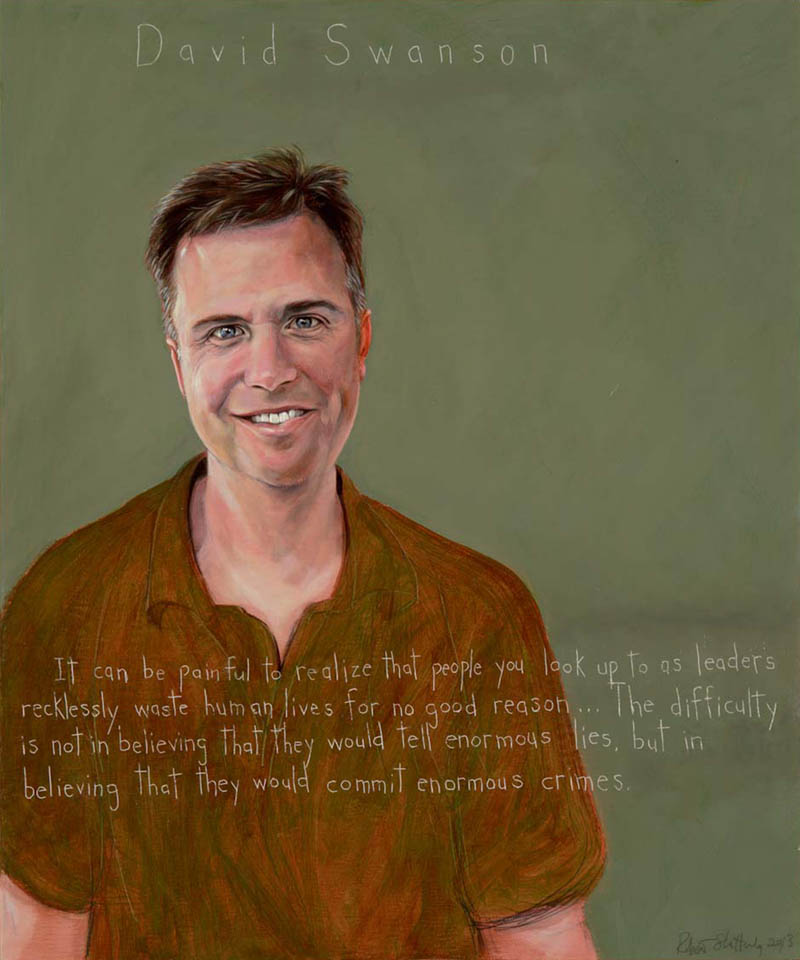
David Swanson
Author, activist, agitator : b. 1969
“It can be painful to realize that people you look up to as leaders recklessly waste human lives for no good reason… The difficulty is not believing that they would tell enormous lies, but in believing that they would commit enormous crimes.”
Biography
In 2011, when David Swanson learned that former Vice President Dick Cheney was planning a visit to Charlottesville, Virginia, he emailed a letter to local law enforcement asking them to arrest Cheney for conspiracy to commit torture. Shortly thereafter, Cheney cancelled his visit. For this provocative act, Charlottesville’s weekly independent newspaper,The Hook, named Swanson runner-up for Charlottesville’s Person of the Year.
David Swanson is a radical journalist and activist for peace. Born December 1, 1969 in New York City, he has built his life and career around speaking out against torture and war, and making the case against corrupt government practices. He was a fierce critic of the Bush administration’s policies, and continues to be generally critical of policies that promote violence and injustice. Swanson is active in protest groups, including Veterans for Peace and the Green Shadow Cabinet, which “provides an ongoing opposition and alternative voice to the dysfunctional government in Washington D.C.” He is a leading figure in American alternative media, writing at his personal website, davidswanson.org, and at warisacrime.org. He hosts Talk Nation Radio and works for rootsaction.org, an “online initiative dedicated to galvanizing Americans who are committed to economic fairness, equal rights, civil liberties, environmental protection — and defunding endless wars.”
In the 1990s, Swanson earned a master’s degree in philosophy at the University of Virginia, where he developed his “clarity and creativity of thought.” By reading widely in history and philosophy, Swanson became “aware of how radically differently people have viewed the world in other times and places.” This observation made Swanson believe that change is possible and motivated him to work for radical changes in how we see the world and choose to act in it. As a student, he was active in the campaign for a living wage. After graduating, he worked briefly as a mainstream journalist, first at The News Virginian and later at Culpeper News. Frustrated by the censorship of mainstream editors, he sought out alternative media sources to publish his writing.
Swanson became directly involved in politics when he acted as the communications director for Dennis Kucinich’s 2004 presidential campaign. For five years, he was the director of communications for ACORN (Association of Community Organizations for Reform Now), a non-profit group that advocated for social justice.
Together, all these experiences have shaped and refined the worldview that permeates his writing and activism:
“I came to appreciate the significance of dumping our money into a war machine rather than schools, houses, green energy, all the things we actually value. And I see the mass murder of people, which is what war is, as the most awful thing we allow to be done that could be easily prevented.”
Swanson wrote the introduction to Dennis Kucinich’s The 35 Articles of Impeachment and the Case for Prosecuting George W. Bush (2008). Swanson’s own titles include Daybreak: Undoing the Imperial Presidency and Forming a More Perfect Union (2009), War Is A Lie (2010), When the World Outlawed War (2011), and The Military Industrial Complex at 50 (2012).
Swanson is on a mission to change the way Americans think about war and justice. He writes, “I would like ‘just war’ to sound as offensive as ‘charitable rape’ or ‘humanitarian slavery’ or ‘benevolent child abuse,’ and I know that it can sound that offensive because it sounds so to me.”
Programs
Americans Who Tell the Truth (AWTT) offers a variety of ways to engage with its portraits and portrait subjects. Host an exhibit, use our free lesson plans and educational programs, or engage with a member of the AWTT team or portrait subjects.

Education
AWTT has educational materials and lesson plans that ask students to grapple with truth, justice, and freedom.

Exhibits & Community Engagement
AWTT encourages community engagement programs and exhibits accompanied by public events that stimulate dialogue around citizenship, education, and activism.